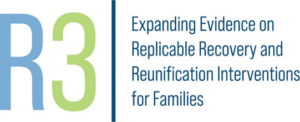
Morrison is providing training and technical assistance to replicate and evaluate the Parent Mentor Program in Oregon, Michigan, Minnesota, and Virginia through the Replication of Recovery and Reunification Interventions for Families—Impact Study (R3 project).
The R3 project is supporting evaluation and replication of two recovery coaching interventions, including Morrison’s Parent Mentor Program.
The Administration for Children and Families (ACF) in the U.S. Dept. of Health and Human Services provided funding to the R3 project to replicate an intervention utilizing coaches for families engaged in the child welfare system due to parental substance use disorders that demonstrates favorable parental recovery outcomes and shortens time to reunification.
This contract was awarded to Abt Associates* and its subcontractors, Joseph Ryan (University of Michigan), Carrie Furrer (Portland State University), Child Trends, Morrison Child and Family Services, Children and Family Futures, Faces and Voices of Recovery, and The Adjacent Possible.
Building rigorous research evidence about recovery coaching in child welfare:
- Goal of R3 is to replicate promising family recovery and reunification interventions that use recovery coaching, build evidence for inclusion in FFPSA Clearinghouse
- Parental SUD among most common risk factor families involved in Child Welfare
- Interest in use of recovery coaches to improve access and engagement in treatment and recovery support services
- Parent Mentor Program was among 3 recovery coaching interventions eligible for the study due to participation in three previous evaluations
- Study estimated to be a five-year process from 2020 – 2025
The evaluation creates a path for the Parent Mentor Program to become an eligible service under the Family First Prevention Services Act and eligible for Title IV-E reimbursement.
This will be a huge step towards scaling the funding available to states for Peer Recovery Coaching services and ensuring parents are helping parents move from active addiction to active recovery.
Click here for more detailed information on why this is important
*Abt Associates is an independent, non-partisan research and evaluation firm providing research and technical assistance to support effective social programs and policies for over 50 years.
Evidence Base for Parent Mentor Program
- Initial research found that the majority of parents responded positively to the Parent Menor Program’s self-directed change model, developed recovery skills, and engaged in treatment and recovery activities.
- Key recovery mentoring practices:
- Assertive outreach & frequent contact
- Give parents a voice
- Warmth, kindness and connection
- Information, transportation and accompaniment
- Advocacy
- Helping parents understand how systems work
- Honesty & accountability
- Be there for parents
- Build support networks
- Promising Short-Term Outcomes for Parents*
- Parents engage with recovery and other services earlier because they communicate barriers and are not afraid of being misunderstood or judged.
- Parents see new possibilities: recovery and successful child welfare case closure are possible.
- Parents derive a sense of self-worth from walking alongside their mentors’ recovery.
- Parents feel worthy, which feeds their sense of self-efficacy to take on challenges.
- Parents feel motivated to make progress in their recovery and child welfare cases.
*Source: IV-E Waiver Parent Mentor Program Research Findings (2015) Portland State University via Interviews and Surveys with Mentors and Parents




